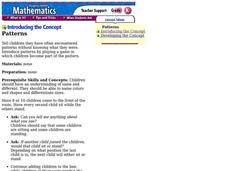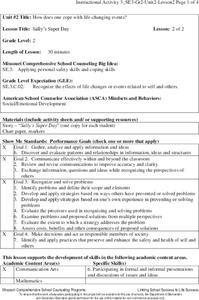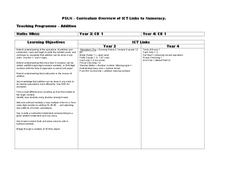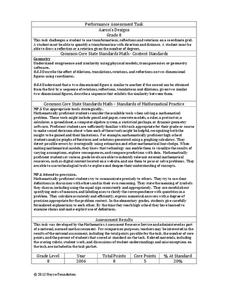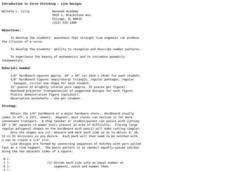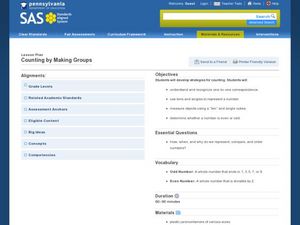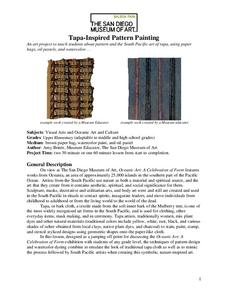Curated OER
Two Part Patterns
Students stand in a boy-girl-boy-girl pattern to demonstrate what a pattern might be. They separate into groups and create two part patterns using construction paper of different colors.
Curated OER
Strange Elevators: Creating and Extending Patterns
Second graders solve problems by recognizing patterns, creating patterns and extending them. They compare and contrast patterns.
Curated OER
Patterns
Fifth graders explore patterns. In groups, 5th graders participate in a "Pasta Pattern" activity. Given a bag of pasta, classmates sort pasta by shapes. They use pasta pieces to model different patterns. Students complete a bean...
Curated OER
Pattern Using Unit Cells
Students explore the pattern of the unit cell. In this science lesson, students color the unit cells on a worksheet and create a pattern using unit cells.
Curated OER
Patterns
Students make patterns. In this early sequencing lesson, students observe and state a pattern when they see one. The teacher begins be using students to demonstrate a pattern with half of the children standing and every other child sitting.
EngageNY
Exploring the Symmetry in Graphs of Quadratic Functions
Math is all about finding solutions and connections you didn't expect! Young mathematicians often first discover nonlinear patterns when graphing quadratic functions. The lesson begins with the vocabulary of a quadratic graph and uses...
Curated OER
The Marvels of Mud
Young scientists roll up their sleeves and get a little dirty in this three-day earth science investigation. Following the scientific method, children monitor the growth of algae in pond water samples in order to determine the role that...
Missouri Department of Elementary
Sally’s Super Day
After having a bad day, Sally took scholars' suggestions and had a super day. Pupils listen to her newest short story then discuss the events that occurred. They sort each event by what was in her control and what was not. Participants...
Mathematics Vision Project
Geometric Figures
Logical thinking is at the forefront of this jam-packed lesson, with young mathematicians not only investigating geometric concepts but also how they "know what they know". Through each activity and worksheet, learners wrestle with...
EngageNY
Successive Differences in Polynomials
Don't give your classes the third degree when working with polynomials! Teach them to recognize the successive differences and identify the degree of the polynomial. The lesson leads learners through a process to develop an understanding...
CK-12 Foundation
Visual Patterns: Building the Queen's Tower
A resource fit for a queen. Scholars recognize and continue a pattern in towers people are building for a queen. They write and use an algebraic expression for the number of tiles in the towers.
Curated OER
Curriculum Links To Numeracy
Youngsters practice looking for the links to numeracy in their classes. This isn't a worksheet but a curriculum guide for an entire unit. Teachers can use any part of the resource to extend or inform their teaching practices related to...
Inside Mathematics
Aaron's Designs
Working with transformations allows the class to take a turn for the better. The short assessment has class members perform transformations on the coordinate plane. The translations, reflections, and rotations create pattern designs on...
Missouri Department of Elementary
An Apple a Day
Three apples—green, red, and rotten—exemplify character traits, negative and positive. Following a discussion about the classroom community, scholars complete an apple-themed worksheet that challenges them to read each trait, color it...
101 Questions
Coins in a Circle
Round and round you'll go! Learners watch as different-sized circles fill with coins. They collect data and then make a prediction about the number of coins that will fit in a large circular rug.
Curated OER
Introduction to Curve Stitching - Line Designs
Students develop their awareness that straight line segments can produce the illusion of a curve and helps them recognize and describe number patterns and geometric fundamentals.
Curated OER
A Meal of Endurance
Students evaluate the nutritional value of the explorers' meals. This is done through analyzing caloric intake versus caloric expenditure, describing the trend in diet change that explorers experienced over a two year expedition, ...
Curated OER
U Boat Hunt
Students recognize patterns and sequences in numbers. In this geometry lesson, students create rules to define the sequences and patterns they obsere. They translate coded messages as they dicuss navigational terms.
Curated OER
Counting by Making Groups
First graders represent, compare, and order numbers. In this counting skills lesson, 1st graders use manipulatives to demonstrate one-to-one correspondence and to represent numbers. This lesson includes a teacher script to guide the lesson.
Curated OER
Which Fish Where?
Here is a lesson outline that prompts elementary learners to graph and analyze data regarding fish caught along the Hudson River. They will review vocabulary and complete 2 worksheets which can be accessed by clicking on the provided links.
Curated OER
Ordering Rational Numbers and Finding Their Approximate
Middle schoolers explore the concept of ordering rational numbers on a number line. They represent rational numbers as decimals and percents. Pupils create a foldable about converting fractions to decimals to percents, and use a...
West Contra Costa Unified School District
The Power of Ten: Building a Magnitude Model
Add visual representation to teaching place value with a magnitude model. Using adding machine tape, pupils build a linear place value strip from 1 to 100.
Curated OER
Sentence Patterns II: Locating Objects and Complements
What sets this worksheet apart are the clear, concise explanations for some rather complex grammatical terms. Object complements, subject complements, transitive and intransitive verbs, and direct and indirect objects are all carefully...
San Diego Museum of Art
Tapa-Inspired Pattern Painting
Middle schoolers are encourage to try their hand at traditional Oceania tapa art by crafting their own cloth using brown paper bags. Included in the resource is background information about the cultures of Oceania and their art.






